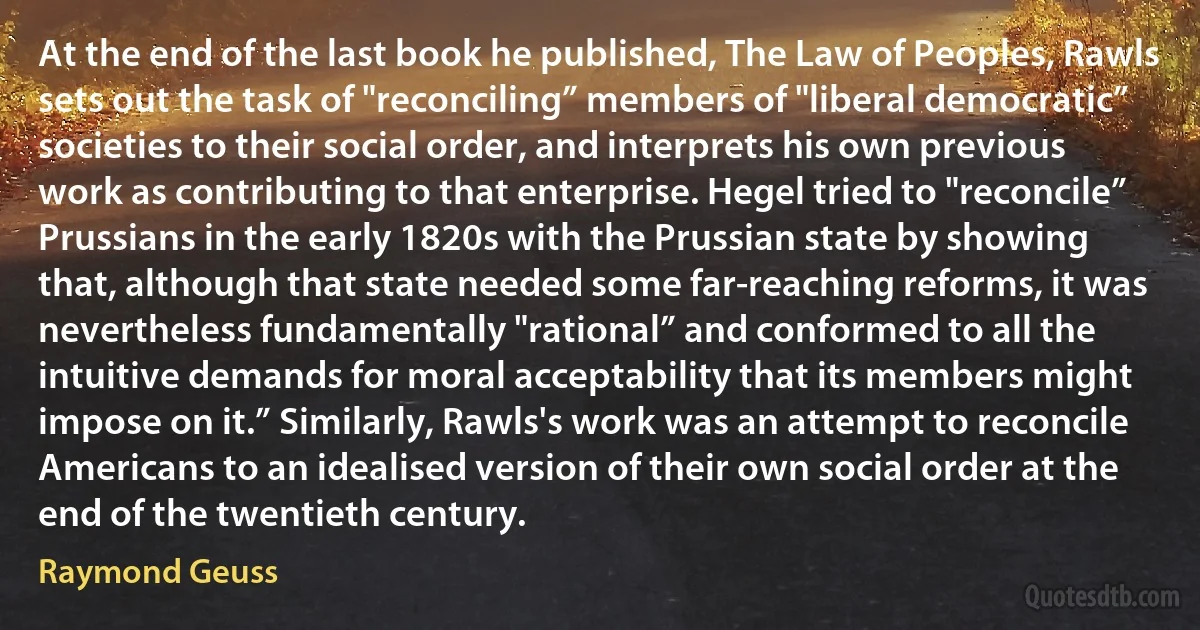
At the end of the last book he published, The Law of Peoples, Rawls sets out the task of "reconciling” members of "liberal democratic” societies to their social order, and interprets his own previous work as contributing to that enterprise. Hegel tried to "reconcile” Prussians in the early 1820s with the Prussian state by showing that, although that state needed some far-reaching reforms, it was nevertheless fundamentally "rational” and conformed to all the intuitive demands for moral acceptability that its members might impose on it.” Similarly, Rawls's work was an attempt to reconcile Americans to an idealised version of their own social order at the end of the twentieth century.
Raymond GeussRelated topics
acceptability attempt book century democratic early end impose intuitive last law might order prussian showing state task try version work hegel peoplesRelated quotes
People tell me, "Oh, you must not advocate doing anything illegal." My answer to them is that I have been a law-abiding man all my life. I believe in law and order. I believe that we must have a society governed strictly by laws, not by mobs or by any tyrant's whims of the moment -- or by any clever tribe of alien manipulators who have gained control of our mass media. But does anyone really believe that we have a society governed by laws today? Let us remember that we are living now in the era of O. J. Simpson and Bill Clinton. We have laws on the books, and we have police and courts which have the theoretical responsibility for enforcing those laws. And when it is Politically Correct to do so, they will.

William Luther Pierce
New York is one of the capitals of the world and Los Angeles is a constellation of plastic, San Francisco is a lady, Boston has become Urban Renewal, Philadelphia and Baltimore and Washington wink like dull diamonds in the smog of Eastern Megalopolis, and New Orleans is unremarkable past the French Quarter. Detroit is a one-trade town, Pittsburgh has lost its golden triangle, St. Louis has become the golden arch of the corporation, and nights in Kansas City close early. The oil depletion allowance makes Houston and Dallas naught but checkerboards for this sort of game. But Chicago is a great American city. Perhaps it is the last of the great American cities.

Norman Mailer
It is almost irresistible for humans to believe that we have some special relation to the universe, that human life is not just a more-or-less farcical outcome of a chain of accidents reaching back to the first three minutes, but that we were somehow built in from the beginning. ... It is very hard to realise that this is all just a tiny part of an overwhelmingly hostile universe. It is even harder to realise that this present universe has evolved from an unspeakably unfamiliar early condition, and faces a future extinction of endless cold or intolerable heat. The more the universe seems comprehensible, the more it also seems pointless.

Steven Weinberg
Capitalism is the use of wealth in private hands to create more wealth. It is the existing world-wide modern system of organizing production and trade by private enterprise, free to seek profit by employing human labor. Its defenders argue that never, since the beginning of history, has there been such a thing as perfect equality and harmony;... and every know period of history had rich and poor, and that actually modern technology, plus liberal democracy, plus an increased social sense, plus Capitalism, have created the modern world, and that as far as the standard of living of the average man is concerned the modern world surpasses all previous epochs of history.

Dorothy Thompson
The origin of this research was an attempt to extend Cassel's system of equations of price determination in one market to that of several trading countries. Although the point of departure is totally different, the results of that attempt (presented in chapter III) exhibit important similarities to Heckscher's treatment in ‘‘The Effect of Foreign Trade on the Distribution of Income,'' published one year earlier in Ekonomisk Tidskrift, 1920. There is no doubt that the author was unconsciously influenced by Heckscher's paper both at this and at later stages of the work. The influence of this pathbreaking paper, both conscious and unconscious, has surely been particularly decisive in the development of the material in chapters I–III.

Bertil Ohlin
